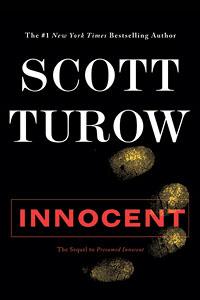Varieties of Guilt
The sequel to the book that jumpstarted the legal-thriller genre. Innocent, by Scott Turow ’70 (Grand Central Publishing)
Reviewed by Rand Richards Cooper ’80
 |
[Fiction] Years ago an Amherst classmate of mine read Scott Turow’s bestselling 1987 novel Presumed Innocent and found himself consumed by admiration and envy. “Turow and I are both federal prosecutors with Amherst degrees,” the friend told me. “But I’m reading his book on the train to work, while he wrote it on the train to work.” He sighed. “I’ve gotta come up with an idea.”
Presumed Innocent jumpstarted the legal-thriller genre and spawned fevered dreams of literary fame in a million lawyers. Turow crammed his debut work of fiction with the procedures and paradoxes of law, amped up the courtroom drama surrounding a mysterious murder and added a wickedly clever plot twist at the end. His compulsively engaging effort won him millions of readers and a spot on the cover of Time, heralded as the “Bard of the Litigious Age.”
His sequel picks up the story two decades later, with the original cast mostly intact. Rusty Sabich, the falsely accused prosecutor-protagonist of Presumed, is now an appellate judge, still married to Barbara, whose rash misdeed informed the first novel’s closing shocker. The Sabichs’ marriage has curdled into resentment and silence—“a dungeon of voiceless suffering,” in which a depressed and medicated Barbara lashes out sporadically in acid rage. And again Rusty, despite his public air of rectitude, is cheating on her.
These dreary facts spark competing hypotheses when Barbara unexpectedly dies in her sleep. Is it the natural death of a woman with rampant heart disease in her family? Suicide by drug overdose? Poisoning? What follows is a ferociously enjoyable exercise in courtroom déjà vu. Again Rusty is charged with murder, prosecuted for a second time by his old nemesis Tommy Molto and again defended by the courtly and cunning Sandy Stern. Enough doubt exists for us to wonder if perhaps Rusty did it.
As a prose writer, Turow will never be accused of practicing metaphorical restraint. (Exhibit 1: “My heart right now is like some overloaded man-of-war toppled by a light wind, sinking into waters it was meant to sail.”) But he’s
a terrific storyteller, entrapping us in Hitchcockian anxiety as Tommy Molto assembles a damning circumstantial case against our man. Why did Rusty privately ask a convicted murderer what it felt like to poison his victim? Why were Rusty’s—and only Rusty’s—fingerprints on the bottle of medication his wife may have overdosed on? Why did he wait almost 24 hours before calling the police? Deftly, Turow brings us to the unsettling and fundamental recognition that both prosecution and defense are themselves fictions, narratives that rely not on ultimate truth but on persuasiveness.
Innocent is the rare novel that gets better as it goes along. Beneath the constant turning of the plot lies a preoccupation with guilt and a skepticism concerning the limits of legal guilt and innocence. Turow catalogues the varieties of guilt that seep through our lives, proving that our best and worst qualities are all mixed up together. For instance, when Sandy Stern plays his own debilitating and disfiguring struggle with cancer to score points with the jury, we have to wonder: is this sleazy opportunism, or is it courage? Or both? As for Rusty, his willingness to accept judgment suggests that he deserves to pay for something. But what? His involvement in covering up a murder two decades ago? His multiple infidelities? His deceptive treatment of his son?
Turow understands that as we plow through our lives, the guilts pile up behind. Innocent is suffused with a mellow and pervasive regret arising from a dour awareness of the passage of time, of the recklessness of our desires and the ambiguity of nearly all motives, and beneath it all, of the stubborn persistence of secrets. Innocent faithfully delivers its verdict on Rusty, but Turow is after bigger fish than the merely legal. When Rusty confesses—to us, not to the jury—his baffled search for “the unnamable piece of happiness that has eluded me for sixty years,” we understand that it is not something he is proud of. To his credit as a novelist, Scott Turow understands that literature begins where the law ends, with the obdurate neediness of the self, committing crimes only a reader can indict.
Rand Richards Cooper is working on a book about midlife fatherhood.